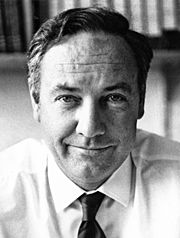Donald Metcalf facts for kids
Quick facts for kids
Donald Metcalf
|
|
|---|---|
 |
|
| Born | 26 February 1929 |
| Died | 15 December 2014 (aged 85) Melbourne, Australia
|
| Nationality | Australian |
| Known for | discovering the colony stimulating factors |
| Awards |
|
| Scientific career | |
| Fields | medicine |
| Institutions | Walter and Eliza Hall Institute of Medical Research |
Donald Metcalf was an amazing Australian medical scientist. He was born on February 26, 1929, and passed away on December 15, 2014. He spent most of his career at the Walter and Eliza Hall Institute of Medical Research in Melbourne. Dr. Metcalf was famous for his important discoveries about how our bodies make blood cells. His work has helped many people, especially those fighting serious illnesses.
Contents
Becoming a Scientist
Donald Metcalf studied medicine at the University of Sydney. This is where he first got to experience medical research. In 1954, he received a special scholarship called the Carden Fellowship. This allowed him to work at the Walter and Eliza Hall Institute of Medical Research.
Early Research Focus
At the institute, Dr. Metcalf first studied virology, which is the study of viruses. He also researched leukemia, a type of blood cancer. Later, he shifted his focus to hematology, which is the study of blood and blood-forming organs.
Discovering Blood Cell Secrets
Dr. Metcalf's most important research was about how our bodies control the making of blood cells. In the 1960s, he created new ways to grow blood cells in a lab. This led to a huge discovery: he found special proteins called colony-stimulating factors (CSFs).
What are CSFs?
CSFs are like tiny messengers in our bodies. They tell our bone marrow to make more white blood cells. White blood cells are super important because they help our bodies fight off infections. Dr. Metcalf discovered several types of CSFs, including G-CSF and GM-CSF.
How CSFs Help People
Thanks to Dr. Metcalf's work, CSFs are now used widely in medicine. For example, patients getting chemotherapy often have a weakened immune system. Giving them CSFs helps boost their white blood cell count. This makes them stronger and better able to fight infections. CSFs are also used to help collect blood stem cells for transplants.
Awards and Special Honours
Donald Metcalf received many awards for his groundbreaking work. These awards show how important his discoveries were to science and medicine around the world.
Australian Honours
In Australia, he was recognized with high honours. In 1976, he became an Officer of the Order of Australia (AO). Later, in 1993, he was promoted to Companion of the Order of Australia (AC).
International Recognition
He also won many major international prizes, including:
- The 1988 Robert Koch Prize
- The 1993 Lasker-DeBakey Clinical Medical Research Award
- The 1993 Louisa Gross Horwitz Prize
- The 1995 Royal Society Royal Medal
These awards highlight his huge impact on medical research globally.
About His Life
Donald Metcalf lived in Melbourne with his wife, Josephine. They had four daughters and six grandchildren. He passed away in 2014 after an illness.
In 2000, he wrote a book about his life and work called Summon up the Blood: In dogged pursuit of the blood cell regulators.
 | Precious Adams |
 | Lauren Anderson |
 | Janet Collins |

